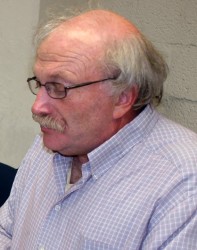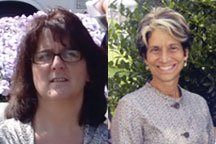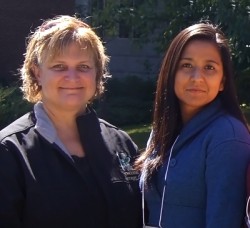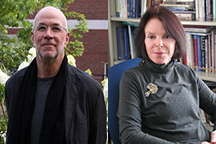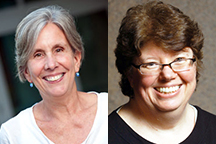CCIDS Faculty, Staff and Trainees Present Research and Work-in-Progress at 2014 AUCD Annual Conference
Faculty, staff and NH LEND trainees from the University of Maine Center for Community Inclusion and Disability Studies recently presented their research and work-in-progress at the 2014 Association of University Centers on Disabilities (AUCD) Conference in Washington, DC. AUCD, founded in 1971, is a network of interdisciplinary centers advancing policy and practice for and with individuals with intellectual, developmental and other disabilities, their families, and communities.
The theme of the 2014 conference, AUCD Unleashed: The Power of Engagement, reflects the network’s goal of achieving an elevated level of engagement with communities and networks to better inform, enhance, and enrich the work that network members are doing to improve the lives of people with disabilities and their families.
CCIDS faculty, staff and trainee presentation topics included the following: family-centered transition planning; the reestablishment of Maine’s Head Start State Collaboration Office; and utilizing Maternal and Child Health leadership competencies to evaluate and improve the New Hampshire Leadership Education in Neurodevelopmental and Related Disabilities (LEND) program.
Implementing Family-Centered Transition Planning: Current Status and Future Plans (40 pg. PDF)
Alan Kurtz, M.Ed., Ph.D. Candidate, Coordinator of Education and Autism Initiatives; University of Maine Center for Community Inclusion and Disability Studies
The Family-Centered Transition Planning model has demonstrated significant improvements in transition outcomes. This presentation presents results of efforts to implement the model with community organizations and to examine (a) whether outcomes are better when transition planning takes place earlier, and (b) how participation in planning affects the post-school expectations of students and parents. We will also discuss the implications of plans to expand the model.
The Power of Re-engagement: Re-establishing Maine’s Head Start State Collaboration Office (PDF)
Susan Russell, M.S., Associate UCEDD Director; University of Maine Center for Community Inclusion and Disability Studies
Linda Labas, M.Ed., Early Childhood Coordinator and MHSSCO Director; University of Maine Center for Community Inclusion and Disability Studies
Following several years of inactivity, the Maine Head Start State Collaboration Office (MHSSCO) was relocated to the University of Maine Center for Community Inclusion and Disability Studies in Fall 2013. The work of the MHSSCO is based on collaborations and partnerships: its re-engagement with existing collaborators and new partners, amid significant structural changes and funding cuts to Maine’s early childhood system, coincides with a promising period of systems redesign.
Transitioning to Adult Services: Curriculum to Increase Understanding of Available Services in Maine (PDF)
Kimberly Davis, Doctor of Occupational Therapy, Associate Professor, Husson University; 2013-2014 NH LEND Trainee, University of Maine Center for Community Inclusion and Disability Studies
Laura Valencia, B.S., 2013-2014 NH LEND Trainee; University of Maine Center for Community Inclusion and Disability Studies
This session will describe the process of developing a curriculum to educate families of students who are transitioning out of the school system. The focus of this project was to maintain a person first curriculum that intertwined education, employment, natural supports, case management, housing, community engagement and wellness.
The UCEDD as a Model for Transformative Higher Education: An Engagement Approach (PDF)
Stephen Gilson, Ph.D., Professor and Coordinator, Interdisciplinary Disability Studies; University of Maine Center for Community Inclusion and Disability Studies
Elizabeth DePoy, Ph.D., Professor, Interdisciplinary Disability Studies; University of Maine Center for Community Inclusion and Disability Studies
This session demonstrates how the UCEDD structure and approach to disability rights and inclusion provide a natural engagement model for interdisciplinarity, and a structure for major higher education innovation. Through detailing a current initiative which synthesizes disability studies and research within an interdisciplinary health and well-being agenda, we illustrate an engagement model to be used by UCEDDs to integrate disability studies, research, and community partnerships throughout institutions of higher education.
Utilizing the Maternal and Child Health Leadership Competencies v3.0 for LEND Program Evaluation
Betsy Humphreys, Ph.D., LEND Training Director; NH LEND Program, University of New Hampshire Institute on Disability
Rae Sonnenmeier, Ph.D., Faculty; NH LEND Program, University of New Hampshire Institute on Disability
Susan Russell, MS, Associate Director, Center for Community Inclusion and Disability Studies; LEND Training Coordinator at UMaine, NH LEND Program
Alan Kurtz, MEd, Ph.D. Candidate, Coordinator of Education and Autism Initiatives, Center for Community Inclusion and Disability Studies; Faculty, NH LEND Program
Through the Maternal and Child Health (MCH) Leadership Competencies, the MCH network has articulated a clear framework for LEND program development forged on competency-based assessment. The purpose of this poster is to demonstrate how the competencies were used over a three-year period for ongoing evaluation and improvement of the NH LEND curriculum. Insights based on using the competencies at three points during the trainees’ individual program will be presented.


